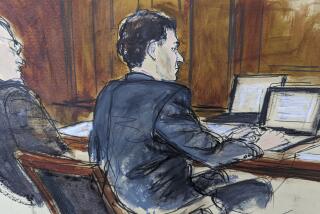Star Witness in Winans Case Admits Theft : Ex-Broker Admits He Stole at Least $41,000
- Share via
NEW YORK — Peter N. Brant, the government’s star witness in its stock-fraud case against former Wall Street Journal reporter R. Foster Winans, acknowledged Friday that he stole at least $41,000 from the account of one of his brokerage clients and manipulated stock trades in other clients’ accounts.
Brant’s testimony came on his first day of cross-examination by an attorney for Kenneth P. Felis, a co-defendant with Winans. Felis is Brant’s ex-college roommate and, like the witness, a former stockbroker at Kidder, Peabody & Co.
Winans, Felis, and David Carpenter, Winans’s roommate, are on trial in federal court here on charges that they schemed to trade stocks and stock options illicitly on the basis of advance knowledge of columns that Winans was writing for the Journal. The trading allegedly took place from October, 1983, to March, 1984, when the scheme was exposed and the Journal fired Winans.
Issued Invitation
For most of the day, Felis’s lawyer, E. Michael Bradley, attempted to show that stock-market losses in late 1983 had left Brant’s personal financial situation so desperate that he had reason to hatch the trading plan.
In his testimony on Thursday, Brant credited the scheme to Winans. But under cross-examination Friday, he conceded that he himself had invited Winans to his Long Island home for a weekend meeting. That was the same meeting at which, he contends, Winans proposed the scheme on Oct. 16, 1983.
Winans was then one of two principal writers of the Journal’s influential Heard on the Street column, a daily collection of Wall Street gossip and research that often inspires movement in the prices of stocks that it mentions.
Brant, 32, who was Winans’s principal contact at Kidder, Peabody, was the firm’s top broker in 1983, earning about $1.8 million in commissions. He has pleaded guilty to three counts of conspiracy and fraud in the case and awaits sentencing.
Under Bradley’s questioning, Brant testified that in a year his personal assets had risen to $16.5 million from $2.5 million in September, 1982. Much of the $10 million he then owned in securities, however, was tied up in the stock of Digital Switch Corp.
Digital, a small telecommunications company based in Richardson, Tex., whose stock had risen to $150 per share from $15 during the yearlong bull market that began in August, 1982.
As the stock floundered in late 1983, Brant said, his personal fortunes declined with it. In fact, Winans himself quoted Brant in a column, without identifying him by name, as saying: “If this keeps up I’m going to be wiped out.”
Brant also acknowledged that his record at Kidder, Peabody was not one of unalloyed success. He first deceived the firm in filing out a personal biography upon his employment in 1976, when he cited his father’s name as “Morton Brant.” In fact, he said, it is Bornstein.
Furthermore, several clients had complained in lawsuits that he traded improperly in their accounts. One complainant was David W. C. Clark, a lawyer who has been charged by the SEC with joining Winans, Carpenter, Felis and Brant in the trading scheme but is not under indictment in this case.
Clark, once a polo-playing friend of Brant’s, charged that Brant looted his accounts of $2 million between October, 1982, and January, 1984; Brant contends that the accounts were jointly financed by himself and Clark and he had a right to the money.
More to Read
Inside the business of entertainment
The Wide Shot brings you news, analysis and insights on everything from streaming wars to production — and what it all means for the future.
You may occasionally receive promotional content from the Los Angeles Times.










